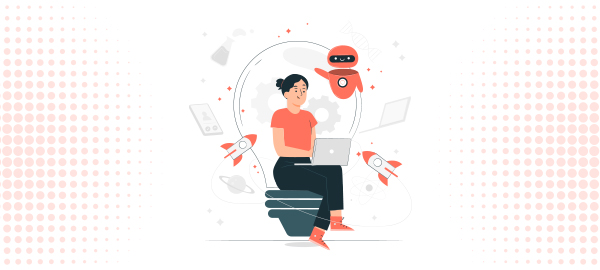The advancement in science and technology has automated a great deal of tasks that required human intervention in the past. The advent of Artificial Intelligence brought a significant amount of change in similar aspects. Be it in STEM fields like Information Technology and Healthcare or in creative fields like Content Creation and Marketing, Artificial Intelligence is making its presence felt in all directions. This blog would explore the impact of AI in the Marketing World. However, before delving right into it, let’s understand what Artificial Intelligence actually is.
Artificial Intelligence (AI) refers to the development of computer programs and systems that can perform tasks typically requiring human intelligence, such as learning, reasoning, problem-solving, perception, and decision-making. AI develops algorithms and models that can process large amounts of data, identify patterns and relationships, and make predictions or recommendations based on that data.
AI has numerous applications across various industries, including healthcare, finance, transportation, and entertainment. It has the potential to revolutionize many aspects of our lives, from improving medical diagnosis and treatment to optimizing supply chain management and enhancing personalized recommendations in e-commerce. AI has numerous practical applications, ranging from personal assistants like Siri and Alexa to complex systems that can help diagnose diseases or drive autonomous vehicles.
How is AI impacting the Marketing Domain?
Artificial Intelligence (AI) is transforming the field of marketing, enabling marketers to make data-driven decisions, personalizing customer experiences, and optimizing marketing campaigns. Here are some of the ways in which AI is driving the field towards better accuracy and targeted results:
- Personalization: AI enables marketers to deliver personalized experience to customers by analyzing their behavior, preferences, and purchase history. Companies can use AI-powered tools to segment their audience, create personalized content, and deliver targeted messages to each segment.
- Predictive Analytics: AI can help organizations predict customer behavior and preferences by analyzing data from various sources, such as social media, website analytics, and CRM systems. Predictive analytics can help their marketing teams in optimizing their marketing campaigns and improving their ROI.
- Chatbots: AI-powered chatbots are becoming increasingly popular as a way to engage with customers in real-time, answering their questions, and providing personalized recommendations. Chatbots can help businesses provide better customer service, furthermore increasing customer satisfaction.
- Voice Search: With the rise of smart speakers and virtual assistants, voice search is becoming an important part of the marketing landscape. AI-powered voice assistants can help businesses optimize their content for voice search and provide personalized recommendations to customers.
- Content Creation: AI-powered tools like ChatGPT, can help marketers create content more efficiently by generating headlines, creative copy and writing articles for content marketing. These tools can save marketers time and resources and help them produce more engaging content.
However, while AI has numerous benefits in marketing, there are also some potential negative impacts to consider:
- Job displacement: As AI technology becomes more advanced, it has the potential to automate many tasks that were previously done by humans, such as data analysis, content creation, and customer service. This could lead to job displacement for a large population of marketing professionals.
- Bias and ethical concerns: AI algorithms are only as good as the data they are trained on. If the data is biased or incomplete, the AI system may perpetuate that bias, leading to unfair or discriminatory outcomes. It’s important for marketers to be aware of these issues and ensure that their AI systems are trained on unbiased and diverse data.
- Privacy concerns: AI systems rely on large amounts of data to function, which can raise privacy concerns for customers. Marketers need to ensure that they are collecting and using customer data in a transparent and ethical manner.
- Over-reliance on AI: While AI can be a valuable tool for marketers, there is a risk of over-reliance on AI systems at the expense of human intuition and creativity. Marketers need to balance the use of AI with human expertise and judgment.
The development of tools like ChatGPT and its recent successor GPT-4 by OpenAI has made AI widely popular and easily available to carry out content-based marketing functions. Though the tool came as a relief to many Small and Medium Enterprises that couldn’t afford a highly professional all-rounded marketing team, it posed a threat of job displacement for writers across the industry. This is the first time when a development using AI caused a widespread impact across the world in both positive and a negative manner. However, as the company continues to work on the technology, we can expect a higher degree of similar outcome.
Conclusion:-
AI has many potential benefits for marketing, it’s important for marketers to be aware of the potential negative impacts and take steps to mitigate them. Overall, AI is transforming marketing by enabling marketers to personalize experiences, make data-driven decisions, and optimize campaigns. As AI continues to evolve, we can expect to see even more innovative applications of AI in marketing in the years to come.


